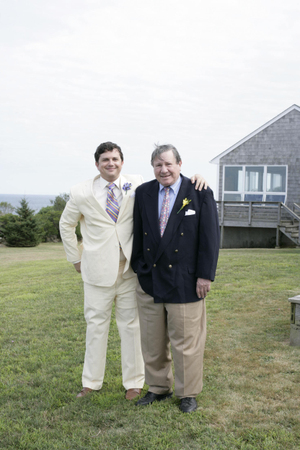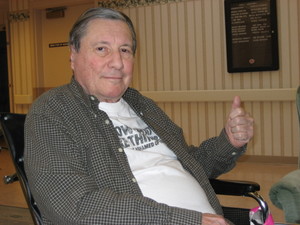
James writes:
I never thought this would be a medical blog, but the events of the New Year have changed that for me and Dara.
On December 30, 2006, at around 6:30 pm, my father, Carl Panero, suffered a stroke while dining at a restaurant on Block Island, Rhode Island, where he lives. Friends immediately noticed unusual behavior--an inability to communicate, and confusion. The Island police and doctor were summoned. They diagnosed stroke-like symptoms and readied the local airline for a medial evacuation. My father was off-island within an hour, and admitted to Westerly Hospital. Once stable, within the evening doctors transferred my father to the ICU at Rhode Island Hospital in Providence.
An MRI scan has revealed that my father either suffered a hemorrhagic stroke or a more unusual type of stroke called an amyloid angiopathy. Both concern bleedings into the brain. Amyloid is not your typical stroke that is brought on by high blood pressure and high cholesterol; my father was remarkably healthy in those two areas. His stroke was rather the result of weakened blood vessels in the brain, most likely caused by age, and of blood leaking into the brain from these weakened vessels.
A sizeable amount of blood was discharged into the left front side of his brain. This could have caused permanent damage to his faculties of speech, reason, and some motor coordination. We will be able to determine the extent of this damage within the next several days, as the blood is broken down naturally. In the meantime, my father is being monitored for seizures and other complications caused by the swelling of these blood deposits. Doctors report that he had a number of small seizures on the evening he was admitted, and two large seizures the morning of 1/2. Although they have been unpleasant for him, these events most likely have not caused additional long-term damage. My father continues to be on anti-seizure medication to reduce the chance of their reoccurrence.
Aside from the seizures, my father appears to be in stable condition. He is generally aware of his surroundings, able to move--in a weakened state--with some encouragement, able to nod, able to communicate through facial expressions, able to understand basic commands, able to digest food. He is also able to say a few basic words--yes, no, hello--but not able to speak or write beyond that.
My father has been improving at a good rate and has been evaluated to be eligible for acute rehabilitation. This means that his evaluators believe he will be receptive to 3 hours a day of physical, occupational, and speech therapy--the highest level. Within a week of the stroke he was transferred to a nearby rehab center. Here he can continue to be monitored by the doctors who admitted him at the time of his stroke. The average rehab time is two to three weeks.
Unless there are complications to his condition, the worst stage of my father's stroke is now behind us. He will only improve from here. How much he improves, however, is an inexact science and varies greatly patient to patient. Physical therapy will work to strengthen his body to the point that he can move again on his own. While no part of his body became immobile by the stroke, the right side of his body is noticeably weak.
My father has been impaired mainly by what doctors call expressive aphasia. This means that while he is able to understand many of the words spoken to him, he is not able to process the language and grammar to respond. This affects both his power of speech and writing. The hope is that as the blood drains out from the stroke area within the next couple months, and the nerve endings damaged by the blood begin to function again, through rehabilitation he can regain some expressive capabilities. He is already able to walk on his own, with supervision. Memory, reason, speech, and other cognitive functions are still noticeably impaired, although also improving. While he is responsive to the therapists, and seems to understand the need to engage in his own recovery, his attention can flag. He is also prone to confusion.
Now the puzzle for Dara and I--we are his 'health care proxies'--is where my father should go next. He lived on his own on Block Island. Now that's no longer an option.
No one is ever fully prepared for these scenarios, but we have been fortunate in the support and advice we have received from friends and family. My hope is that through this weblog, we can also at times share some of the things we've learned in helping out my father's recovery.

